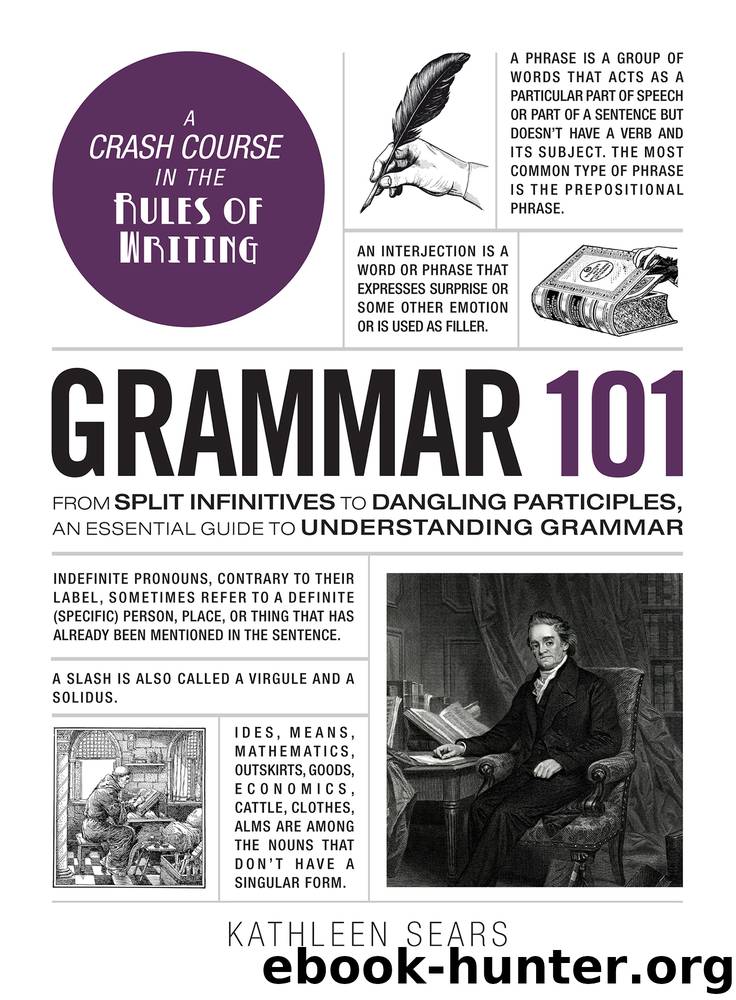Grammar 101 by Kathleen Sears

Author:Kathleen Sears
Language: eng
Format: epub
Publisher: Adams Media
* * *
An independent clause is a set of words with a subject and its verb that expresses a complete thought; it could stand alone as a sentence. A dependent clause—while having a subject and verb—makes no sense by itself; it can’t stand alone as a sentence.
* * *
Now for a trickier example:
Eugene worried about (who, whom) Ike would be teamed with in the competition.
As you can tell, this sentence has two clauses (you could tell that, couldn’t you?). Remember that you’re only concerned with the clause that contains the who/whom question. In this case, take the words after about, scramble them to make a statement, substitute he or him, and you have “Ike would be teamed with him in the competition.” Since you used him, you would know that the original sentence would use whom (remember the mnemonic him = whom). So the original sentence would read this way:
Eugene worried about whom Ike would be teamed with in the competition.
Here’s another example that you have to stop and think about:
Was that (who, whom) you thought it was?
When you look only at the clause the who/whom is concerned with and you substitute he/him, you have “it was he/him.” A light bulb goes off in your head because you recognize that was is a linking verb. That tells you to use he (the predicate nominative).
Download
This site does not store any files on its server. We only index and link to content provided by other sites. Please contact the content providers to delete copyright contents if any and email us, we'll remove relevant links or contents immediately.
Cecilia; Or, Memoirs of an Heiress — Volume 1 by Fanny Burney(32536)
Cecilia; Or, Memoirs of an Heiress — Volume 2 by Fanny Burney(31934)
Cecilia; Or, Memoirs of an Heiress — Volume 3 by Fanny Burney(31925)
The Lost Art of Listening by Michael P. Nichols(7485)
Asking the Right Questions: A Guide to Critical Thinking by M. Neil Browne & Stuart M. Keeley(5751)
We Need to Talk by Celeste Headlee(5604)
On Writing A Memoir of the Craft by Stephen King(4924)
Dialogue by Robert McKee(4385)
Pre-Suasion: A Revolutionary Way to Influence and Persuade by Robert Cialdini(4213)
I Have Something to Say: Mastering the Art of Public Speaking in an Age of Disconnection by John Bowe(3871)
Elements of Style 2017 by Richard De A'Morelli(3336)
The Book of Human Emotions by Tiffany Watt Smith(3289)
Fluent Forever: How to Learn Any Language Fast and Never Forget It by Gabriel Wyner(3074)
Name Book, The: Over 10,000 Names--Their Meanings, Origins, and Spiritual Significance by Astoria Dorothy(2969)
Why I Write by George Orwell(2944)
Good Humor, Bad Taste: A Sociology of the Joke by Kuipers Giselinde(2939)
The Art Of Deception by Kevin Mitnick(2785)
The Grammaring Guide to English Grammar with Exercises by Péter Simon(2733)
Ancient Worlds by Michael Scott(2675)
